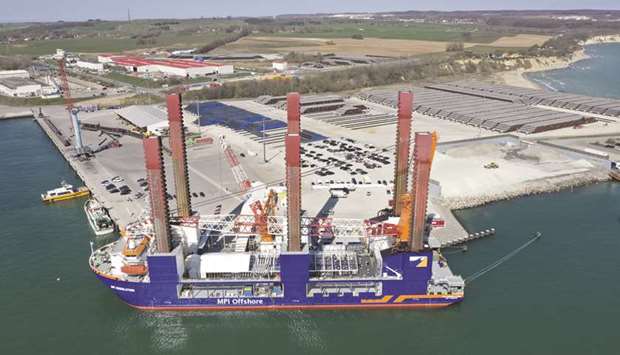The controversial Nord Stream 2 natural gas pipeline faces potential delays as a German government adviser denied the country was drawing up legislation that would waive the project from European Union energy laws.
Lawmakers in Germany are set to anchor the revised EU gas rules into national law, according to Stefan Rolle, an adviser in Germany’s Economy & Energy Ministry, who described as “complete nonsense” media reports that the bill would provide an exemption for the Russian-German pipeline. Legislators are expected to approve the bill next week. A vote was postponed on Thursday.
The EU law requiring separate ownership of gas and transmission lines extends into pipelines from third countries. It offers an exemption to links completed by May 23, a provision that Nord Stream 2 says should apply to its business. The company behind the project can seek a waiver from the law though the German energy authority, the Bundesnetzagentur.
“It is not 100% that Bundesnetzagentur will decide negatively on the derogation, but I would say it is rather probable they cannot decide positively on the derogation,” Rolle said on Thursday. “And I do not see any scope for a derogation for Nord Stream 2.”
The European Union gas directive came into effect in May, and member states are obliged to adopt it into their domestic laws by February 24. The German law implementing the EU directive “probably” will become effective in the beginning of December, according to Rolle.
Nord Stream 2 wasn’t immediately available to comment.
Bild Zeitung and Bloomberg reported on Wednesday that Chancellor Angela Merkel’s coalition was working to set up its domestic law in a way that would allow Nord Stream 2 to redefine the legal definition of the project’s “completion.”
The 1,230km (764-mile) undersea pipeline from Russia to Germany is 87% complete and the company still has to lay 336km of the infrastructure. It was initially planned to start at the end of this year.
Sections of pipe sit on a raised platform at the landing site of Nord Stream 2 gas pipeline, in Lubmin, Germany.
Nord Stream 2 could consider creating an independent pipeline operator to comply with Europe’s gas directive, Rolle said.
Project owner Gazprom PJSC is preparing to create a legal entity that will comply with the directive, the Handelsblatt newspaper reported on Thursday.
The pipeline overcame a major hurdle last week when it received approval to cross Denmark’s waters. But it could take several months between when the pipeline is completed and flows ramp up.
Other obstacles could delay the process even more.
The link has drawn the threat of sanctions from the US, which wants Europe to buy its liquefied natural gas. It has also divided EU governments, with nations led by Poland concerned about the bloc’s increasing dependence on Russian gas.
Ukraine, one of the biggest routes for Russian gas to Europe, called on Germany not to waive parts of the EU gas directive for Nord Stream 2. Prime Minister Oleksiy Honcharuk said on Thursday that it would “mean a violation of the consensus decision adopted by all EU member states.”
“You can’t really count on Nord Stream 2 to be operational in the first half of next year,” said Thierry Bros, a senior research fellow of The Oxford Institute for Energy Studies and a member of the EU-Russia Gas Advisory Council.
“It is always harder to lay down the pipeline during the winter,” he said. “Also, ramping up is a challenge. If you look at Nord Stream 1, it took from five to six years to ramp up. And people can appeal. Other things can happen.”
French electricity and gas firm Engie SA, OMV AG, Royal Dutch Shell Plc, Uniper SE and Wintershall DEA, are also investors in the Nord Stream 2 project along with Gazprom.

The MPI Resolution turbine installation vessel sits moored as sections of pipe for the Nord Stream 2 gas pipeline is seen on the dock at Mukran Port in Sassnitz, Germany. Lawmakers in Germany are set to anchor the revised EU gas rules into national law, according to Stefan Rolle, an adviser in Germany’s Economy & Energy Ministry.
